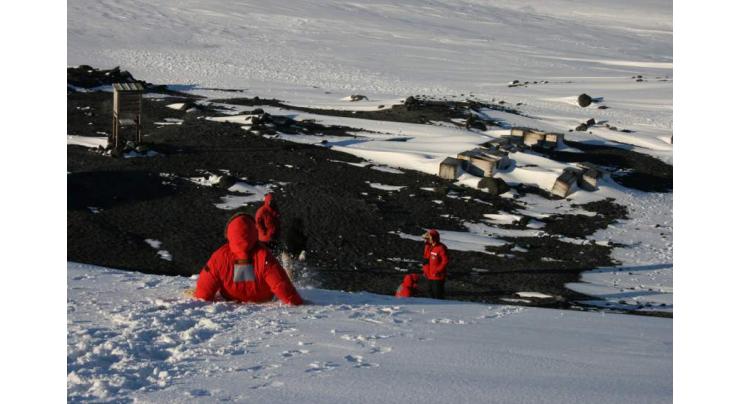
UK, Russia Agree On Need To Regulate Tourism, Research In Antarctica - London
Mohammad Ali (@ChaudhryMAli88) Published February 14, 2020 | 04:21 PM

The United Kingdom and Russia both share the opinion that tourism and scientific research in Antarctica must be subject to regulation, Jane Rumble, the head of the Polar Regions Department of the UK Foreign and Commonwealth Office, told Sputnik in an interview, while also casting doubts on the feasibility of extracting minerals on the continent
MOSCOW (UrduPoint News / Sputnik - 14th February, 2020) The United Kingdom and Russia both share the opinion that tourism and scientific research in Antarctica must be subject to regulation, Jane Rumble, the head of the Polar Regions Department of the UK Foreign and Commonwealth Office, told Sputnik in an interview, while also casting doubts on the feasibility of extracting minerals on the continent.
Rumble stated that Antarctica's increased accessibility poses a number of challenges for signatories of the Antarctic Treaty, an agreement signed in 1959 by the UK, Soviet Union and 10 other countries, that regulates activities on the continent.
"Antarctica is becoming more accessible, easier to get to, more international, so there are challenges that we need a shared outcome for. We have some similar views to our Russian colleagues on the need to effectively manage international activities in Antarctica," Rumble remarked.
In particular, the UK and Russia are united in calling for greater regulation of scientific research and tourism in Antarctica. According to the International Association of Antarctica Tour Operators, 56,000 people visited Antarctica in the 2018-19 season, a 53 percent increase compared to 2014-15.
"We, therefore, share the objectives of the treaty which are to keep Antarctica peaceful, to promote science, and in order to do this, we both share the view that we need to have a strong regulatory system which is very clear about how to manage things like tourism, and science activities," Rumble stated.
The UK official also appeared to doubt the feasibility of extracting minerals from Antarctica, stating that it would require consensus from all signatories of the Antarctic Treaty. Additionally, the exorbitant cost of conducting mineral extraction on the continent makes it unlikely that any state would seek permission to do so.
"From now and into the future, all countries who are party to the treaty would need to agree that we would exploit minerals, and I do not foresee that very soon, for the simple reason that Antarctica is an extremely expensive place to go, and we have not yet run out of minerals anywhere else. There is no current pressure to pursue mineral activity in Antarctica," Rumble stated.
A protocol to the Antarctic Treaty, which was signed in 1991 and came into force in 1998, indefinitely bans mining on the continent.
The Russian Navy will conduct a round-the-world oceanographic expedition this year dedicated to the 200th anniversary of the discovery of Antarctica, during which it will carry out extensive research on Earth's southernmost continent, the expedition's head Oleg Osipov told Sputnik on January 28.
Related Topics
Recent Stories

Human cases of bird flu 'an enormous concern': WHO

IHC reinstates Bushra Bibi’s plea for shifting to Adaila Jail

Six hotels sealed, ten held over bread rates violations

Khana Badosh writer’s café to hold literary session on Ganoo Saamtani’s boo ..

Commissioner reviews performance of price control magistrates

Beijing's GDP up 6 pct in Q1

China's Q1 goods, services trade surplus exceeds 60 bln USD

Harmful ketchup producing factory seized

Pakistan Stock Exchange (PSX) loses 43 points

Ch Shafay visits Directorate of Consumer Protection Council

Will personally monitor Saudi investment projects; no laxity to be tolerated: PM

Two killed in road accident in Bahawalnagar
More Stories From World
-

Human cases of bird flu 'an enormous concern': WHO
4 minutes ago -
Deemah highlights Pakistan's digital potential at ICTN Asia Conference
51 minutes ago -
German far-right firebrand in court for using Nazi slogan
1 hour ago -
Inter seeking Milan derby Serie A title delight
1 hour ago -
Football: Italian Serie A table
1 hour ago -
Germany arrests two over military base attack plot for Russia
2 hours ago
-
Ukraine says hit Russian airfield in annexed Crimea
2 hours ago -
China's Wang meets Indonesia's Jokowi, president-elect Prabowo
2 hours ago -
Gauff, Raducanu shine in Stuttgart
2 hours ago -
China's coal-rich Shanxi Province sees coal output fall 18.9 pct in Q1
2 hours ago -
China awards medals to Shenzhou-16 astronauts
2 hours ago -
Iron ore futures close higher
2 hours ago
